In the freezing cold, a crowd began to form outside the locked doors of the Palestine Museum, Bristol. Its numbers were composed primarily of students, though the interested public were represented too. With an hour to spare before the performance, we were guided upstairs to the exhibition space by one of the impassioned museum volunteers.
The museum walls are lined with infographics, articles, interviews, and images. It is incredibly powerful and informative content, but I must admit that it’s overwhelming in volume, and I noticed many attendees giving up in favour of conversation.
Invaluable, though, are the first-hand accounts, dedication of the museum volunteers, and impact of inescapable facts and photographs physically before you. Whilst the permanent exhibition may benefit from more selective curation, its existence is essential – this alone creates space for a much-needed dialogue on the situation in Palestine.
Back downstairs, every seat was filled. The obscure architecture and glitter-splattered floor provide a contrasting backdrop for two art exhibitions: #BeyondWordsGaza by English artist Kerry, and vibrant, emotive female portraits by 17-year-old Palestinian Malak Mattar. Whilst art may seem naïve or futile in the face of war, it is an important outlet for overwhelming emotion and positive action. Kerry’s portraits aim to bring comfort to the families of those lost in Palestine in 2014, and Mattar’s are for sale, with proceeds split 50/50 between the artist and the museum.
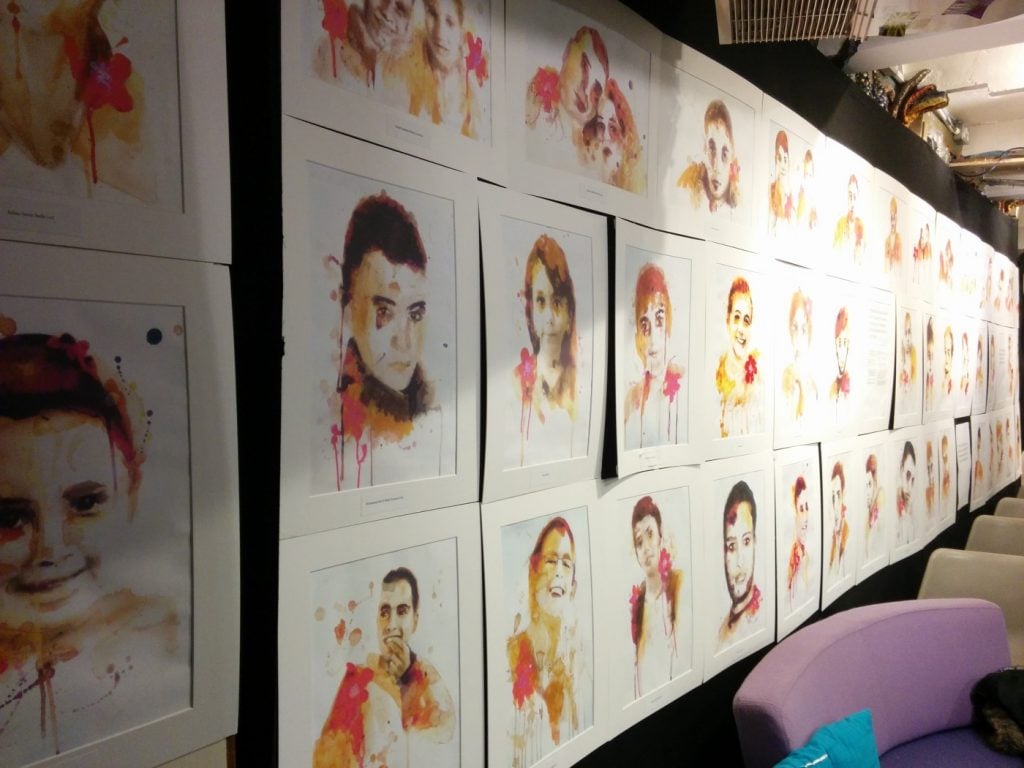
#BeyondWordsGaza. Photo: Hannah Emadian
Palestinian-American performance poet Remi Kanazi appeared. He dominated the tiny stage with his towering stature and captivating presence. Lurching forward into the opening line of a piece, he jumped back, announcing that that was just a test, that it had gone well, and that he’d proceed. He demanded not only our attention, but our involvement too, and we were collectively eager to oblige. We clicked our fingers, cheered, and clapped in support at choice words that rose above the rest. Kanazi used the first portion of his set to introduce himself and his beliefs to us through personal poems about social media or people who’ve angered him. Following this insight into his position and person, the poems on Palestine began. The truth (emotional and factual) of his words hit hard; we added sighs, and gulps, and tears to our repertoire of audible responses.
I went in blind, experiencing Kanazi’s words for the first time from his own lips, and I was surprised at the level of comedy weaved into his performance. It worked partly because he (as his mother likes to tell him) is an instinctively amusing character, and partly because humour is a fact of life. Rather than a tasteless guffaw in the face of suffering, Kanazi’s humour injected humanity back into the subject matter, alongside the statistics and politics. And this, I think, was the grand success of the night. With Mattar & Kerry’s portraits flashing across my mind, and Kanazi’s words still ringing in my ears, my neighbour turned to me and opened up. These stories, that are not mine to share with you, exposed the impact that the Israeli-Palestinian Conflict, ongoing since 1948, has had on the life of someone close enough to touch. In that moment, the suffering had a name, and big, feeling eyes. And as wafts of Palestinian cuisine rose up from the basement, my every sense would soon have been hit with artful creations born despite the destruction of war.
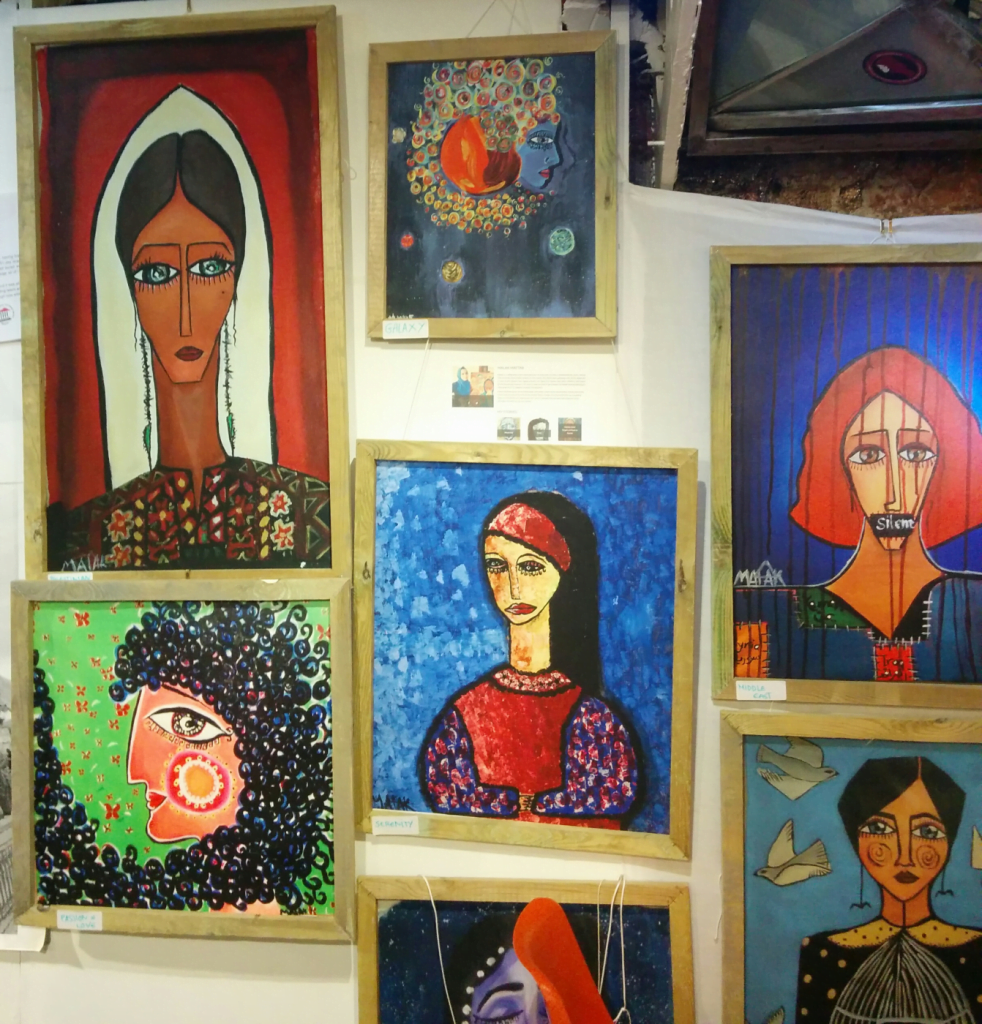
Malak Mattar’s artwork for sale. Photo: Hannah Emadian
I selected this as Bristol’s literary event of the month because it transcended singular categorisation entirely. The reality of the Israeli-Palestinian Conflict was expressed with more power by a single poet than a thousand newsreaders could ever muster. In addition to educating, the event served two purposes: showcasing art and creating community. I would argue that it is through the art that the effects of politics and war were humanised, that the Palestinian people were unmasked and given a wall-full of faces, and that a group of people halfway across the globe could congregate in solidarity. I would argue that through art humanity is revealed. Either way, surely anything that draws attention to this grossly under-discussed topic of global concern is wholly of value.
‘Remi Kanazi – Live Spoken Word in Bristol’ was organised by University of Bristol Friends of Palestine for Israeli Apartheid Week, and was hosted at Palestine Museum, Bristol, on 22/02/18.
Hannah is the regional editor of The State of the Arts in Bristol. Every month she selects one ‘Well Lit’ literary event for review. Last month, Remi Kanazi’s politically-charged performance poetry shone brighter than the rest.
Filed under: Written & Spoken Word
Tagged with: art, bristol, conflict, free palestine, Israel, live poetry, palestine, palestine museum, performance poetry, poet, poetry event, politcal poetry, remi kanazi, spoken word, war
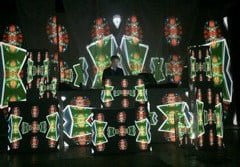
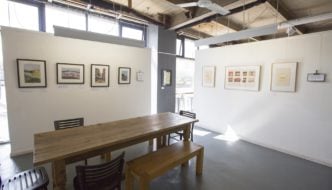
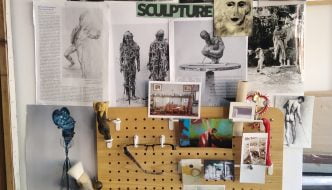
Comments